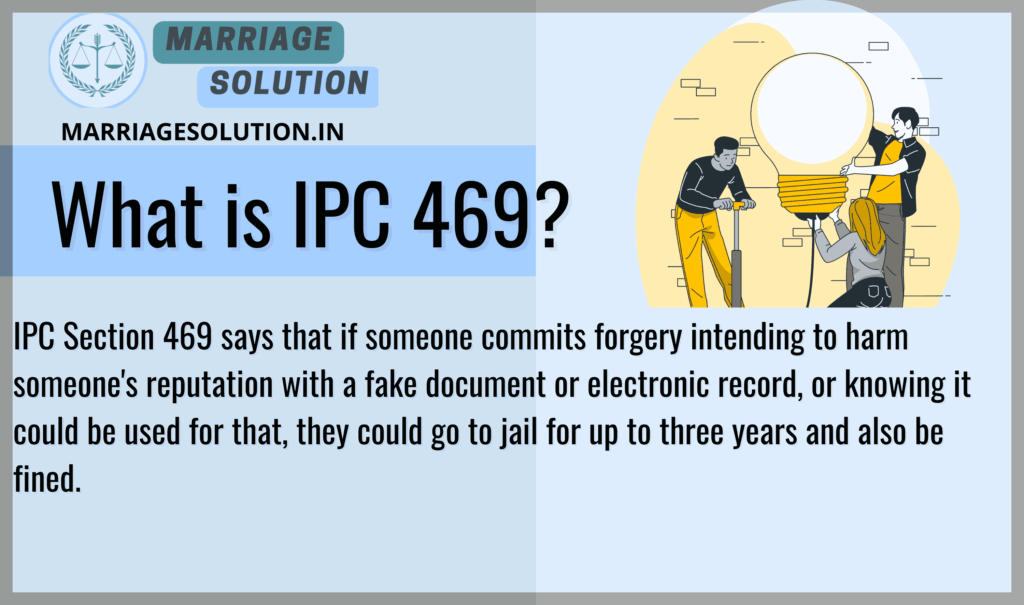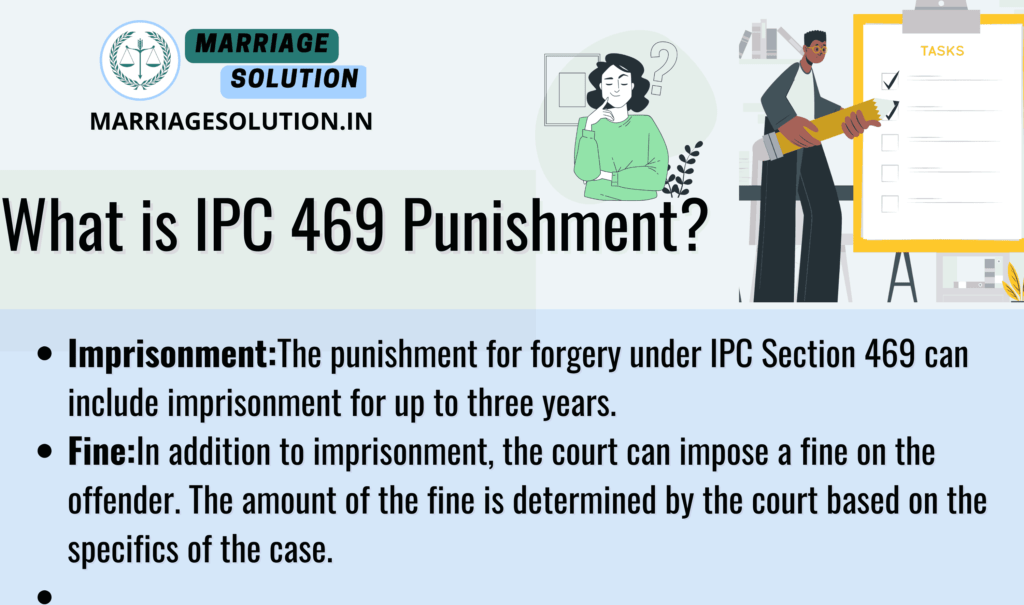Introduction of IPC Section 469
IPC Section 469 deals with forgery intended to damage someone’s reputation. It covers making fake documents or changing real ones, knowing they will harm a person or organization’s reputation. This law protects against defamation through forgery.

What is IPC Section 469 ?
IPC Section 469 says that if someone commits forgery intending to harm someone’s reputation with a fake document or electronic record, or knowing it could be used for that, they could go to jail for up to three years and also be fined.
IPC Section 469 Overview
IPC Section 469 addresses forgery that aims to harm someone’s reputation. It includes making fake documents or changing real ones, knowing they will damage a person or organization’s reputation. This law applies even if there isn’t a direct intent to slander, as long as the forger knows the documents are likely to be used to cause reputational harm.
Key Points
- Forgery with the Intent to Defame:
- IPC Section 469 addresses cases of forgery committed specifically to damage the reputation of a person or organization. This involves creating fake documents or altering real ones, knowing they will be used to harm someone’s reputation.
- Possibility of Damage to Reputation:
- This section also applies if the person forging the documents knows they are likely to be used to harm someone’s reputation, even without a direct intent to slander.
- Level of Punishment:
- The punishment under IPC 469 includes imprisonment for up to three years, reflecting the seriousness of the offense but with a moderate level of incarceration compared to more severe crimes under the Indian Penal Code.
- Additional Fine:
- In addition to imprisonment, the court may impose a fine on the offender. The amount of the fine depends on factors such as the nature and severity of the forgery.
- Non-Bailable Offense:
- IPC 469 is classified as a non-bailable offense, highlighting the gravity of the act and requiring stricter legal procedures before any release.
- Specific Provision:
- This section is a special provision targeting forgery intended to cause reputational damage, distinct from general forgery laws (like IPC Section 465), and emphasizes the legal consequences of harming someone’s reputation through fraud.
IPC 469 Punishment
- Imprisonment:
- The punishment for forgery under IPC Section 469 can include imprisonment for up to three years.
- Fine:
- In addition to imprisonment, the court can impose a fine on the offender. The amount of the fine is determined by the court based on the specifics of the case.

469 IPC bailable or non bailable ?
IPC Section 469 is a non-bailable offense. This means that bail is not granted as a matter of right, and the decision to grant bail lies at the discretion of the court, reflecting the serious nature of the crime.
Section 469 IPC in short information
| What is mean ? | Details |
|---|---|
| Offense | Forgery with the intent to damage the reputation of a person or organization |
| Definition | Creating fake documents or altering real ones, knowing they will harm someone’s reputation |
| Punishment | – Imprisonment for up to 3 years |
| – Fine (amount decided by the court based on the severity of the forgery) | |
| Bailable | Non-bailable |
469 IPC FAQs
What is IPC 469?
IPC 469 states that whoever commits forgery, intending that the forged document or electronic record shall harm the reputation of any party, or knowing that it is likely to be used for that purpose, shall be punished with imprisonment of either description for a term which may extend to three years, and shall also be liable to fine.
What is the essence of the offense under IPC 469?
The essence of the offense under IPC 469 is committing forgery with the intention to harm the reputation of any party, or knowing that the forged document or electronic record is likely to be used for that purpose.
Is the intent to harm reputation necessary for an offense under IPC 469?
Yes, the intent to harm reputation or knowledge of the likelihood of reputation harm is a necessary element for an offense under IPC 469.
Is the offense under IPC 469 bailable?
No, the offense under IPC 469 is a non-bailable offense.
What is the maximum punishment for an offense under IPC 469?
The maximum punishment for an offense under IPC 469 is imprisonment of either description (simple or rigorous) for a term which may extend to three years, and the offender shall also be liable to pay a fine.
If you need support with court proceedings or any other legal matters, don’t hesitate to reach out for assistance.
Court or any other marriage-related issues, our https://marriagesolution.in/lawyer-help-1/ website may prove helpful. By completing our enquiry form and submitting it online, we can provide customized guidance to navigate through the process effectively. Don’t hesitate to contact us for personalized solutions; we are here to assist you whenever necessary!
